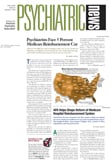Martin, a 70-year-old Georgia resident, experienced two major losses within a relatively close time. First, his wife of 40 years died, and then he remarried, only to have his second wife of six weeks desert him. Both losses left Martin extremely depressed. Then two-and-a-half years later, Martin was diagnosed with pancreatic cancer.
Was there a link between Martin’s depression and his subsequent succumbing to pancreatic cancer? Very possibly, a study in the September/October Psychosomatic Medicine suggests. It has found some statistically significant links between depression and the later onset of pancreatic cancer.
The study was headed by Caroline Carney, M.D., an associate professor of internal medicine and psychiatry at Indiana University School of Medicine in Indianapolis.
The study was based on health insurance claims of some 749,000 persons who filed claims with Wellmark Blue Cross/Blue Shield of Iowa and South Dakota from 1989 through 1993. These persons were considered representative of their respective populations since Wellmark insured nearly half of the people in the counties involved.
Carney and her coworkers found that of the 749,000 people, 75,000 met DSM-IV criteria for a mental disorder. Of that number, the researchers found that about 1,400 subsequently developed some kind of cancer. Of the some 674,000 individuals who did not have a psychiatric condition, about 18,000 developed some kind of cancer.
Of the 1,400 subjects with a psychiatric condition and cancer, 14 subjects developed pancreatic cancer. In contrast, of the 18,000 subjects who did not have a psychiatric condition yet who developed cancer, 101 developed pancreatic cancer.
The investigators then used these data to find out whether persons with a psychiatric disorder had been significantly more likely to develop pancreatic cancer than had subjects without a psychiatric disorder. The answer was yes for men, but not for women.
Carney and her coworkers then analyzed the kinds of psychiatric disorders diagnosed in the 14 subjects who had acquired pancreatic cancer subsequent to a psychiatric condition. Ten of the 14, they learned, had been diagnosed with a major depression.
After that, the researchers zeroed in on the 485 subjects who had been diagnosed with depression before the development of some kind of cancer to calculate the chances of developing, in the wake of depression, pancreatic cancer compared with other gastrointestinal cancers or of developing, in the wake of depression, pancreatic cancer compared with all other kinds of cancers. They found that pancreatic cancer had been diagnosed significantly more often in this group of 485 subjects than had other kinds of gastrointestinal cancers. They also found that pancreatic cancer had been diagnosed significantly more often in this group of 485 subjects than had all other kinds of cancers.
Thus, putting all these findings together, it looks as though there might be a unique relationship, at least in men, between depression and the subsequent development of pancreatic cancer.
But why? One possibility is that depression might be a symptom of a burgeoning pancreatic malignancy. In contrast, the average interval between depression diagnosis and pancreatic diagnosis in subjects was 1.5 years. And as Carney pointed out in an interview, “With pancreatic cancer, it is still unknown which hormonal mechanisms, if any, [might] lead to depression.”
Another possibility is that persons who are depressed and who then later develop pancreatic cancer do so because they are cigarette smokers, not because they are depressed. After all, cigarette smoking is a risk factor for pancreatic cancer. Carney told Psychiatric News, “We know that persons with mental illness are more inclined to abuse tobacco products than those without, [and] in other analyses using these data, we’ve found that tobacco-related cancers are increased in the mental disorders group.”
Yet a third possibility is that depression might predispose a person to pancreatic cancer since depression is known to have a negative impact on the body’s immune system.
“This study represents an important contribution to our understanding of a possible association of depression and pancreatic cancer,” Jimmie Holland, M.D., attending psychiatrist at Memorial Sloan-Kettering Cancer Center in New York City, told Psychiatric News. “The use of population-based longitudinal insurance claims data. . .provides a novel way to explore preexisting depression and later diagnosis of pancreatic cancer. . . . The tantalizing suggestion is raised of a biological mechanism associated with depression that predisposes to pancreatic cancer, or that early preclinical stages of pancreatic cancer produce a depression-producing substance long before physical signs and symptoms develop. . . . However, the small number of pancreatic cases found—happily it is rare—limits the generalizations, and the absence of data about smoking makes it important to continue this type of investigation that should include information about the possible confounding variables of tobacco and obesity.”
The study was funded by the National Institute of Mental Health.
An abstract of the study, “Relationship Between Depression and Pancreatic Cancer in the General Population,” is posted on the Web at www.psychosomaticmedicine.org/cgi/content/abstract/65/5/884. ▪
Psychosom Med 2003 65 884
